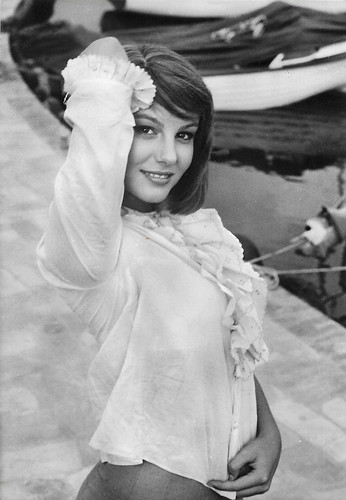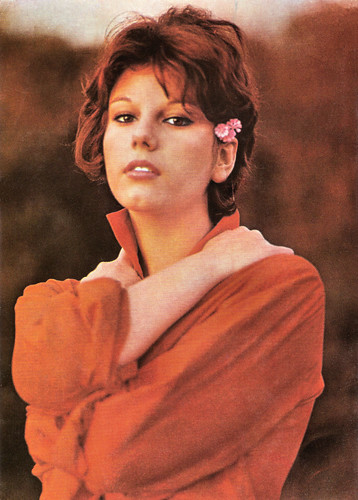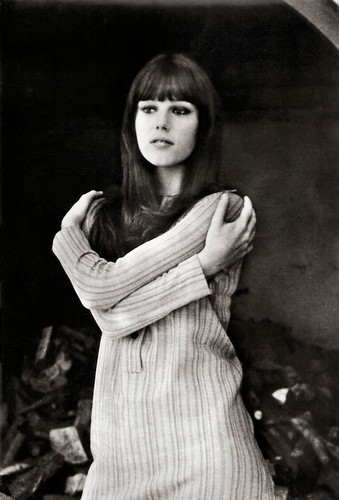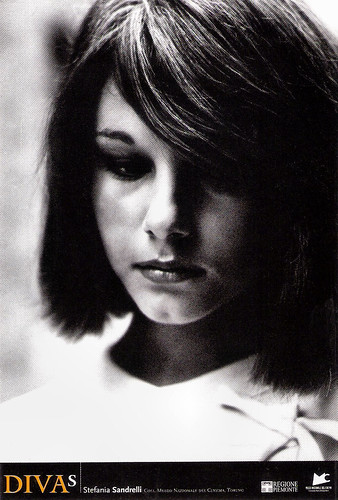On 21 March 2018, Stefania Sandrelli (1946) received the special prize at the 62nd edition of the David di Donatello awards, the Italian equivalent of the Oscars. She received the statuette by TV host Carlo Conti, and according to Italian media she was moved, almost to tears. The sensual, vivacious and very talented Italian actress is famous for her roles in the Commedia all'Italiana. She was 15 years old when she had her breakthrough opposite Marcello Mastroianni in the Oscar winning comedy Divorzio all'italiana/Divorce, Italian Style (1961). Later she also played dramatic roles in Italian classics like Ettore Scola's C'eravamo tanto amati, and Bernardo Bertolucci’s Il Conformista/The Conformist (1970) and Novecento/1900 (1976).

Italian postcard by Alterocca, Terni, no. 64121. Photo: A. Frontoni. Publicity still for La Bella di Lodi/The Beauty of Lodi (Mario Missiroli, 1963).

Romanian postcard by Casa Filmului Acin.
Stefania Sandrelli was born in Viareggio, Tuscany, into a middle-class family, in 1946. She was the daughter of Florida and Otello Sandrelli, owners of a well known pension in Viareggio. Her father died when Stefania was eight years old. She has a brother, Sergio, seven years older, who had a successful music career and died in 2013.
At a young age she learned to play the accordion, and studied ballet. In 1960 Sandrelli won the Miss Cinema Viareggio beauty contest. Next she was the cover girl of the magazine Le Ore and made her cinema debut in Gioventù di note/Youth at night (Mario Sequi, 1961) with Samy Frey and Magali Noël. Her second role was as a confidence trickster and petty thief in the war film Il federale/The Fascist (Luciano Salce, 1961), starring Ugo Tognazzi.
Her film career was definitively launched when she appeared as Marcello Mastroianni's seductive, young cousin, Angela in Divorzio all'italiana/Divorce, Italian Style (Pietro Germi, 1961). The film won an Oscar for Best Original Script. With director Pietro Germi she later worked three more times: in the dark satire of Sicilian social customs and honour laws Sedotta e abbandonata/Seduced and Abandoned (1963), the comedy L'immorale/The Immoralist (1967) featuring Ugo Tognazzi, and Alfredo, Alfredo (1970) with Dustin Hoffman.
Stefania Sandrelli became in a short time a protagonist of the Commedia all'italiana. She was excellent as a lonely, sickly country woman trying to survive in a hostile post-WW II city in Io la conoscevo bene/I Knew Her Well (Antonio Pietrangeli's, 1965) with Mario Adorf. In France, she appeared in the box office hit Tendre Voyou/Tender Scoundrel (Jean Becker, 1966), starring Jean Paul Belmondo. For her role in L'amante di Gramigna/The Bandit (Carlo Lizzani, 1969), Sandrelli was awarded as Best Actress at the San Sebastián International Film Festival.
Throughout the 1970s, Sandrelli continued to be one of the stars of the Commedia all'italiana. She appeared in Mario Monicelli's Brancaleone alle crociate/Brancaleone at the Crusades (1970) with Vittorio Gassman and Adolfo Celi, in Ettore Scola's C'eravamo tanto amati/We All Loved Each Other So Much (1974) with Gassman and Nino Manfredi, and in the satirical comedy-drama L'ingorgo - Una storia impossibile/Traffic Jam (Luigi Comencini, 1979). She also starred in several dramatic films, such as Delitto d'amore/Somewhere Beyond Love (Luigi Comencini, 1974) with Giuliano Gemma.
Sandrelli worked several times with prolific director Bernardo Bertolucci, and starred in his dramas Partner (1968) opposite Pierre Clémenti, Il Conformista/The Conformist (1970) as the wife of Jean-Louis Trintignant, and Novecento/1900 (1976), as the wife of Gérard Dépardieu. She also played in French productions, such as Les Magiciens'/Death Rite (Claude Chabrol, 1976) with Franco Nero, and the crime-thriller Police Python 357/The Case Against Ferro (Alain Corneau, 1976) starring Yves Montand and Simone Signoret. In 1980 she won the Nastro d'Argento for Best Supporting Actress for her performance in Ettore Scola's La terrazzo/The terrace (1980).

Small Czech collectors card by Pressfoto, Praha (Prague), 1965, no. S 83/6. Publicity still for Divorzio all'italiana/Divorce, Italian Style (Pietro Germi, 1961) with Marcello Mastroianni.

Romanian postcard by Casa Filmului Acin.

Italian postcard by Il Museo Nazionale del Cinema, Torino.
After some less successful films, Stefania Sandrelli relaunched her career with the erotic film La chiave/The Key (Tinto Brass, 1983), based on the novel Kagi by Jun'ichirō Tanizaki. The film caused some scandal because of the explicit nude scenes in which Sandrelli was involved and obtained a great commercial success. In the wake of the success of La Chiave, she played in a brief series of successful erotic films. She also continued to appear in dramas like Segreti segreti/Secrets Secrets (Giuseppe Bertolucci, 1985) and the courtroom drama Mamma Ebe/Mother Ebe (Carlo Lizzani, 1985).
One of her best films of this decade was the comedy Speriamo che sia femmina/Let's Hope It's a Girl (Mario Monicelli, 1986), starring Liv Ullman and Catherine Deneuve. For this film Sandrelli was awarded with a David di Donatello for Best Supporting Actress. The film also won the David di Donatello for Best Film, Best Director, Best Supporting Actor, Best Producer, Best Editing and Best Script. Another award winning film was La famiglia/The Family (Ettore Scola, 1987) in which she starred with Vittorio Gassman, Fanny Ardant and Philippe Noiret.
Sandrelli was nominated to the Nastro Argento (Silver Ribbon award) for Best Actress for her role in the historical comedy-drama Secondo Ponzio Pilato (Luigi Magni, 1987), an ironic reinterpretation of the history, starring Nino Manfredi as Pontius Pilate. She won again a David di Donatello for Best Actress for the drama Mignon è partita/Mignon Has Come to Stay (Francesca Archibugi, 1988). The film won another four David di Donatello awards. A popular success was the comedy Il piccolo diavolo/The Little Devil (1988) directed by and starring Roberto Benigni. She also starred opposite Giancarlo Giannini and Emmanuelle Seigner in the drama Il male oscuro/Dark Illness (Mario Monicelli, 1990).
In the following decade, the Italian film industry got into a crisis and Italian films in general were less prolific than they used to be. Sandrelli appeared in TV series and in international productions like the romantic drama Die Rückkehr/The African Woman (Margarethe von Trotta, 1990) with Barbara Sukowa and Samy Frey, the Spanish comedy/drama Jamón Jamón/Ham, Ham (Bigas Luna, 1992), starring Javier Bardem and Penélope Cruz, and the Argentine-American drama De amor y de sombras/Of Love and Shadows (Betty Kaplan, 1994), based on the novel by Isabel Allende and starring Antonio Banderas and Jennifer Connelly.
She played a supporting part in Bertolucci’s Io ballo da sola/Stealing Beauty (Bernardo Bertolucci, 1996) starring Liv Tyler and Joseph Fiennes. That year she also appeared in the comedy-drama Ninfa plebea/The Nymph (Lina Wertmüller, 1996) with Raoul Bova. She won another the Nastro d'Argento for Best Supporting Actress for the Commedia all'italiana La cena/The Dinner (Ettore Scola, 1998). In Portugal, she appeared in Um Filme Falado/A Talking Picture (2003), written and directed by Manoel de Oliveira, and starring Catherine Deneuve and John Malkovich. She continues to appear in films and TV series and her most recent film is the comedy A casa tutti bene/There's No Place Like Home (Gabriele Muccino, 2018).
In 2005 she received the Golden Lion for Lifetime Achievement at the 62nd Venice International Film Festival, and in 2012 she received the title of Chevalier (Knight) of the Ordre des Arts et des Lettres. Stefania Sandrelli had a long and tempestuous relationship with Italian singer-songwriter Gino Paoli, since she was 16. Their daughter Amanda Sandrelli, born in 1964, is also an actress. From 1972 till 1976, she was married to Italian athlete and entrepreneur Nicky Pende with whom she also has a son, Vito (1973). Their marriage ended when Sandrelli had a short affair on the set of Novecento/1900 (1976) with her co-star Gérard Dépardieu. Since 1983, she's the longtime companion of director Giovanni Soldati.
Sandrelli has a passion for wine, and in 1993, she started a partnership with Distilleria Bottega to produce her signature wine ‘Acino d'Oro, Chianti Classico DOCG’ commercially. She also continues to act. More recently, she starred in La passione (Carlo Mazzacurati, 2010), a Commedia all'Italiana which was nominated for the Golden Lion at the 67th Venice International Film Festival, and in the TV series Una grande famiglia/The Family (2012-2015). At IMDb, Manutwo writes: “Stefania Sandrelli represents one of the few actresses who are able to age gracefully and still get interesting roles. She is still regarded as one of the most beautiful women in Italy and she is still able to charm the audience with her sweet smile and sparkling eyes.”
Trailer Divorzio all'italiana/Divorce, Italian Style (1961). Source: ClassicCinemaLovers (YouTube).
Trailer Delitto d'amore/Somewhere Beyond Love (1974). Source: Film&Clips (YouTube).
Sources: Sandra Brennan (AllMovie), Biografieonline.it (Italian), Wikipedia and IMDb.

Italian postcard by Alterocca, Terni, no. 64121. Photo: A. Frontoni. Publicity still for La Bella di Lodi/The Beauty of Lodi (Mario Missiroli, 1963).

Romanian postcard by Casa Filmului Acin.
Divorce, Italian Style
Stefania Sandrelli was born in Viareggio, Tuscany, into a middle-class family, in 1946. She was the daughter of Florida and Otello Sandrelli, owners of a well known pension in Viareggio. Her father died when Stefania was eight years old. She has a brother, Sergio, seven years older, who had a successful music career and died in 2013.
At a young age she learned to play the accordion, and studied ballet. In 1960 Sandrelli won the Miss Cinema Viareggio beauty contest. Next she was the cover girl of the magazine Le Ore and made her cinema debut in Gioventù di note/Youth at night (Mario Sequi, 1961) with Samy Frey and Magali Noël. Her second role was as a confidence trickster and petty thief in the war film Il federale/The Fascist (Luciano Salce, 1961), starring Ugo Tognazzi.
Her film career was definitively launched when she appeared as Marcello Mastroianni's seductive, young cousin, Angela in Divorzio all'italiana/Divorce, Italian Style (Pietro Germi, 1961). The film won an Oscar for Best Original Script. With director Pietro Germi she later worked three more times: in the dark satire of Sicilian social customs and honour laws Sedotta e abbandonata/Seduced and Abandoned (1963), the comedy L'immorale/The Immoralist (1967) featuring Ugo Tognazzi, and Alfredo, Alfredo (1970) with Dustin Hoffman.
Stefania Sandrelli became in a short time a protagonist of the Commedia all'italiana. She was excellent as a lonely, sickly country woman trying to survive in a hostile post-WW II city in Io la conoscevo bene/I Knew Her Well (Antonio Pietrangeli's, 1965) with Mario Adorf. In France, she appeared in the box office hit Tendre Voyou/Tender Scoundrel (Jean Becker, 1966), starring Jean Paul Belmondo. For her role in L'amante di Gramigna/The Bandit (Carlo Lizzani, 1969), Sandrelli was awarded as Best Actress at the San Sebastián International Film Festival.
Throughout the 1970s, Sandrelli continued to be one of the stars of the Commedia all'italiana. She appeared in Mario Monicelli's Brancaleone alle crociate/Brancaleone at the Crusades (1970) with Vittorio Gassman and Adolfo Celi, in Ettore Scola's C'eravamo tanto amati/We All Loved Each Other So Much (1974) with Gassman and Nino Manfredi, and in the satirical comedy-drama L'ingorgo - Una storia impossibile/Traffic Jam (Luigi Comencini, 1979). She also starred in several dramatic films, such as Delitto d'amore/Somewhere Beyond Love (Luigi Comencini, 1974) with Giuliano Gemma.
Sandrelli worked several times with prolific director Bernardo Bertolucci, and starred in his dramas Partner (1968) opposite Pierre Clémenti, Il Conformista/The Conformist (1970) as the wife of Jean-Louis Trintignant, and Novecento/1900 (1976), as the wife of Gérard Dépardieu. She also played in French productions, such as Les Magiciens'/Death Rite (Claude Chabrol, 1976) with Franco Nero, and the crime-thriller Police Python 357/The Case Against Ferro (Alain Corneau, 1976) starring Yves Montand and Simone Signoret. In 1980 she won the Nastro d'Argento for Best Supporting Actress for her performance in Ettore Scola's La terrazzo/The terrace (1980).

Small Czech collectors card by Pressfoto, Praha (Prague), 1965, no. S 83/6. Publicity still for Divorzio all'italiana/Divorce, Italian Style (Pietro Germi, 1961) with Marcello Mastroianni.

Romanian postcard by Casa Filmului Acin.

Italian postcard by Il Museo Nazionale del Cinema, Torino.
The Key
After some less successful films, Stefania Sandrelli relaunched her career with the erotic film La chiave/The Key (Tinto Brass, 1983), based on the novel Kagi by Jun'ichirō Tanizaki. The film caused some scandal because of the explicit nude scenes in which Sandrelli was involved and obtained a great commercial success. In the wake of the success of La Chiave, she played in a brief series of successful erotic films. She also continued to appear in dramas like Segreti segreti/Secrets Secrets (Giuseppe Bertolucci, 1985) and the courtroom drama Mamma Ebe/Mother Ebe (Carlo Lizzani, 1985).
One of her best films of this decade was the comedy Speriamo che sia femmina/Let's Hope It's a Girl (Mario Monicelli, 1986), starring Liv Ullman and Catherine Deneuve. For this film Sandrelli was awarded with a David di Donatello for Best Supporting Actress. The film also won the David di Donatello for Best Film, Best Director, Best Supporting Actor, Best Producer, Best Editing and Best Script. Another award winning film was La famiglia/The Family (Ettore Scola, 1987) in which she starred with Vittorio Gassman, Fanny Ardant and Philippe Noiret.
Sandrelli was nominated to the Nastro Argento (Silver Ribbon award) for Best Actress for her role in the historical comedy-drama Secondo Ponzio Pilato (Luigi Magni, 1987), an ironic reinterpretation of the history, starring Nino Manfredi as Pontius Pilate. She won again a David di Donatello for Best Actress for the drama Mignon è partita/Mignon Has Come to Stay (Francesca Archibugi, 1988). The film won another four David di Donatello awards. A popular success was the comedy Il piccolo diavolo/The Little Devil (1988) directed by and starring Roberto Benigni. She also starred opposite Giancarlo Giannini and Emmanuelle Seigner in the drama Il male oscuro/Dark Illness (Mario Monicelli, 1990).
In the following decade, the Italian film industry got into a crisis and Italian films in general were less prolific than they used to be. Sandrelli appeared in TV series and in international productions like the romantic drama Die Rückkehr/The African Woman (Margarethe von Trotta, 1990) with Barbara Sukowa and Samy Frey, the Spanish comedy/drama Jamón Jamón/Ham, Ham (Bigas Luna, 1992), starring Javier Bardem and Penélope Cruz, and the Argentine-American drama De amor y de sombras/Of Love and Shadows (Betty Kaplan, 1994), based on the novel by Isabel Allende and starring Antonio Banderas and Jennifer Connelly.
She played a supporting part in Bertolucci’s Io ballo da sola/Stealing Beauty (Bernardo Bertolucci, 1996) starring Liv Tyler and Joseph Fiennes. That year she also appeared in the comedy-drama Ninfa plebea/The Nymph (Lina Wertmüller, 1996) with Raoul Bova. She won another the Nastro d'Argento for Best Supporting Actress for the Commedia all'italiana La cena/The Dinner (Ettore Scola, 1998). In Portugal, she appeared in Um Filme Falado/A Talking Picture (2003), written and directed by Manoel de Oliveira, and starring Catherine Deneuve and John Malkovich. She continues to appear in films and TV series and her most recent film is the comedy A casa tutti bene/There's No Place Like Home (Gabriele Muccino, 2018).
In 2005 she received the Golden Lion for Lifetime Achievement at the 62nd Venice International Film Festival, and in 2012 she received the title of Chevalier (Knight) of the Ordre des Arts et des Lettres. Stefania Sandrelli had a long and tempestuous relationship with Italian singer-songwriter Gino Paoli, since she was 16. Their daughter Amanda Sandrelli, born in 1964, is also an actress. From 1972 till 1976, she was married to Italian athlete and entrepreneur Nicky Pende with whom she also has a son, Vito (1973). Their marriage ended when Sandrelli had a short affair on the set of Novecento/1900 (1976) with her co-star Gérard Dépardieu. Since 1983, she's the longtime companion of director Giovanni Soldati.
Sandrelli has a passion for wine, and in 1993, she started a partnership with Distilleria Bottega to produce her signature wine ‘Acino d'Oro, Chianti Classico DOCG’ commercially. She also continues to act. More recently, she starred in La passione (Carlo Mazzacurati, 2010), a Commedia all'Italiana which was nominated for the Golden Lion at the 67th Venice International Film Festival, and in the TV series Una grande famiglia/The Family (2012-2015). At IMDb, Manutwo writes: “Stefania Sandrelli represents one of the few actresses who are able to age gracefully and still get interesting roles. She is still regarded as one of the most beautiful women in Italy and she is still able to charm the audience with her sweet smile and sparkling eyes.”
Trailer Divorzio all'italiana/Divorce, Italian Style (1961). Source: ClassicCinemaLovers (YouTube).
Trailer Delitto d'amore/Somewhere Beyond Love (1974). Source: Film&Clips (YouTube).
Sources: Sandra Brennan (AllMovie), Biografieonline.it (Italian), Wikipedia and IMDb.
3 comments:
What a great piece on Mrs Sandrelli, bringing back so msny memories (I saw Delitto d'Amore at Filmhuis Alkmaar and must have sern Novecento in its entirety about six or seven times now...) THANX,
With Il Conformista, those are her films that made such a strong impression on me too. Thanks for sharing your memories.
Yes, Il Conformista may have been her finest hour (saw that for the first time in a 16-mm film show at the Societeit of Uilenstede, really something else!)
Post a Comment